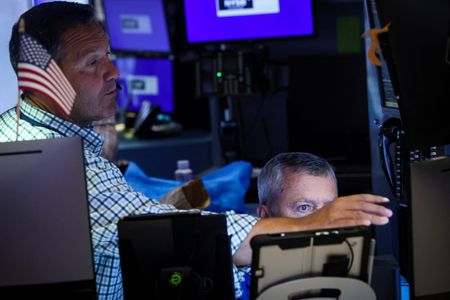By Lisa Pauline Mattackal and Ankika Biswas
(Reuters) – Wall Street’s main indexes slipped on Friday, deepening a sell-off driven by tech stocks and mixed earnings, while investors assessed the impact of a global cyber outage that knocked down CrowdStrike’s shares.
Cybersecurity firm CrowdStrike slumped 9.3% after an update to one of its products appeared to trigger an outage that affected customers using Microsoft’s Windows Operating System, disrupting businesses across sectors.
Microsoft slipped 0.5%, on track for its worst week in three months after a rout in tech stocks.
Major U.S. airlines ordered ground stops citing communication issues. On the trading front, the Euronext exchange and the London Stock Exchange Group’s Workspace news and data platform reported issues, and the FTSE Russell faced disruptions to data.
LSEG later said its data and services were back online, while the New York Stock Exchange and Nasdaq said markets were operational and working normally.
The disruption comes after two grueling sessions for Wall Street, as investors assessed second-quarter earnings and a move away from megacaps that have primarily driven the equity rally in 2024.
Megacaps were largely mixed on Friday, with Nvidia losing 1.1%, while Alphabet gained 0.7%.
Chip stocks slipped, with U.S.-listed shares of Taiwan Semiconductor Manufacturing down 2.6% and Intel dropping 4.9%. The Philadelphia SE Semiconductor Index fell 2%.
Both the Nasdaq and the S&P 500 were on track for their worst week since April.
A softer-than-expected inflation print earlier in July and increasing expectations that Donald Trump could win the U.S. Presidential elections were the catalysts that sparked a broad move away from heavily weighted technology stocks, said Jake Manoukian, Head of U.S. Investment Strategy at J.P. Morgan Private Bank.
“When you had such stretched positioning in tech with those powerful catalysts, that’s why you’ve seen such a historic rotation (to small cap stocks).”
Signaling investor unease, the VIX – Wall Street’s “fear gauge” – was trading at its highest since late April.
Elsewhere, Federal Reserve Bank of New York President John Williams reiterated the Fed remains committed to achieving its 2% inflation target. Comments from the Fed’s Raphael Bostic are due later in the day.
Markets have priced in a 25-basis-point interest-rate cut by September and expect two cuts by year-end according to LSEG data.
At 11:58 a.m. ET, the Dow Jones Industrial Average was down 364.88 points, or 0.90%, at 40,300.14, the S&P 500 was down 23.29 points, or 0.42%, at 5,521.30, and the Nasdaq Composite was down 73.47 points, or 0.41%, at 17,797.76.
Meanwhile, other cybersecurity shares rose, with Palo Alto Networks rising 1.7%, and SentinelOne up 4.9%.
Intuitive Surgical rose 8.4% after a second-quarter results beat.
Netflix slipped 0.7% in choppy trading after the streaming giant cautioned third-quarter subscriber additions would be lower than a year earlier.
Oilfield services provider SLB rose 4.9% after results, while insurance bellwether Travelers Companies lost 6.8%, the biggest Dow decliner, after missing estimates for second-quarter revenue.
S&P 500 companies that have reported second-quarter earnings to date recorded an 85% beat rate.
Declining issues outnumbered advancers for a 2.20-to-1 ratio on the NYSE and for a 1.66-to-1 ratio on the Nasdaq.
The S&P index recorded 27 new 52-week highs and 4 new lows, while the Nasdaq recorded 33 new highs and 66 new lows.
(Reporting by Lisa Mattackal and Ankika Biswas in Bengaluru; Editing by Pooja Desai and Devika Syamnath)





